Perspectives
Look for Prime + Magellan Rx at AMCP 2023
Live updates from AMCP Annual Meeting
March 24, 2023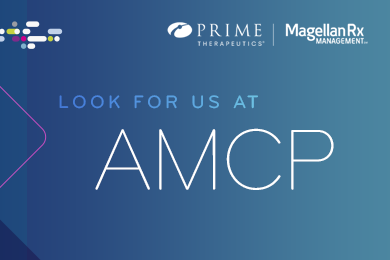
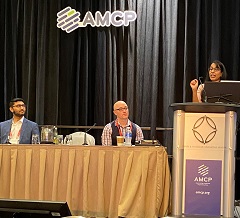
Dr. Prerak Parikh (far left) and Dr. Sneha Sharma (far right) discuss trends in managing ophthalmic therapies and impact of biosimilars in the drug class
Behind the Research with Dr. Prerak Parikh and Dr. Sneha Sharma
Updated 10:00 a.m. CT, March 24, 2023
The final Prime and Magellan Rx presentation at AMCP this year came from Dr. Prerak Parikh and Dr. Sneha Sharma, who presented their research, “Biosimilars in Vision: Addressing Drug Trends and Managed Care Strategies,” at AMCP on Thursday.
Ophthalmic vascular endothelial growth factor (VEGF) inhibitors are first-line treatments for both diabetic macular edema and age-related macular degeneration, and these treatments continue to be a top 10 category of medical drug spend for both Commercial and Medicare populations.
I connected with Dr. Parikh and Dr. Sharma to hear more about their presentation.
Prime: What inspired this research?
Prerak Parikh and Sneha Sharma (PP/SS): Ophthalmology is a category that has two of the highest spend drugs per Centers for Medicare & Medicaid Services data. Within the last two years, there has been a lot of movement with new drugs added, and the ophthalmology pipeline looks promising. The addition of two biosimilars, and the likelihood of others coming, brings about a lot of questions on strategy, efficacy, and competition in the category.
Prime: How does this research achieve AMCP aims of improving access to care and costs?
PP/SS: The entry of biosimilars into the ophthalmic space is already driving down the cost of their reference product. We discussed trends in average sale price of anti-VEGF drugs and the impacts of choosing a cost-effective drug on overall spend, per member per month. We also covered how interchangeable biosimilars with automatic substitution capabilities can improve access to care.
Prime: What key takeaways would you like attendees, or people who can’t attend the show, to know about?
PP/SS: The key is that the anti-VEGF class continues to evolve, but compounded Avastin is still the most cost-effective drug in the category. We also want to keep the biosimilars in the conversation as they will eventually lower overall spend in the ophthalmic space and impact preferencing strategies.
Behind the Research with Dr. Ben Urick
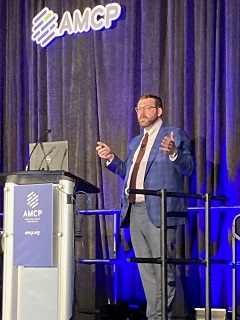
Dr. Ben Urick presents evidence on medical cost offset from increased adherence to therapy
Dr. Ben Urick presents evidence of medical cost offset from increased adherence to therapyUpdated 9:15 a.m. CT, March 24, 2023
If the mission of AMCP is to improve value and access in health care, those aims can be for naught if a patient doesn’t take their medication. Such was the focus of the presentation, “Measuring Medical Cost Offsets from Improvements in Medication Adherence Using Real-World Data,” held earlier this week on day one of the Annual Meeting.
The session’s presenter, Dr. Ben Urick, Health Outcomes Research Principal at Prime Therapeutics, noted that medication adherence can have a profound impact on medical costs. After all, if a patient doesn’t take their medication, potential next steps in treatment may be more expensive or perhaps less effective. And as Dr. Urick noted, much of the previous adherence research data is decades old, doesn’t account for common sources of bias, or includes populations that are different from those targeted by modern adherence support programs.
But, as Dr. Liu and Dr. Ndujiuba noted earlier in that day, the data is key. Fortunately, health care providers have help in improved adherence through four key means, such as predictive modeling, adherence support packaging of medications, targeted counseling interventions, and even apps that remind people to take medications. And Dr. Urick’s research finds, these interventions to improve adherence can result in substantial reductions in medical spending.
I took some time with Dr. Urick after the presentation to learn more about this award-winning research.
Prime: What surprised you most about this presentation to AMCP attendees?
Ben Urick (BU): I was pleased with the strong interest in this presentation. We received many detailed questions, which helped bring context to our presentation and highlight opportunities for future research.
Prime: During your presentation, you polled attendees to see if they believed their organization had sufficient data and expertise to quantify medical cost offsets from medication adherence improvements, and 43% disagreed or strongly disagreed. What was your reaction to this, and how do we change this?
BU: I’m not surprised that nearly half of attendees felt their organization didn’t have the ability to calculate medical cost offsets from adherence improvements. Many organizations have either medical claims or pharmacy claims, but not both.
Prime’s integrated medical and pharmacy claims dataset, which includes claims for more than 20 million members annually, is well-suited to answer this question. Additionally, study designs can be intimidating, and there needs to be a team with a strong foundation in statistics and study design to implement this approach.
Prime: What key takeaways would you like attendees, or people who can’t attend the show, to know about?
BU: As long as the data is available, it’s possible for managed care organizations to implement a pragmatic modeling approach to estimate the relationship between adherence improvements and medical cost offsets. Across a range of seven conditions, we find improvements in adherence results in $300-$900 reduction in medical spending, and these savings estimates can be used to support return on investment calculations for adherence support services.
Elite platinum award winners take the podium
But Dr. Urick’s day was far from over.
On the heels of presenting the session that morning, Dr. Urick was back on the stage that afternoon for the “Award-Winning Research Supporting the Managed Care Pharmacy Research Agenda” presentation, which recapped the four platinum-award winning posters from AMCP this year.
A total of 406 posters were accepted at this years’ Annual Meeting, which makes this recognition from AMCP all that much more impressive.
In addition to a high-level review of his remarks this morning, Dr. Urick thanked his co-presenter, Dr. M. Christopher Roebuck, and reminded attendees of the poster reception event at AMCP later in the week.
Behind the Research with Dr. Michelle Booth and Dr. Andy Killpack
Updated 11:15 a.m. CT, March 23, 2023
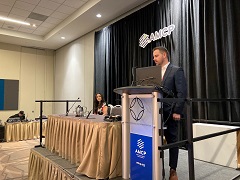
Dr. Michelle Booth (left) and Dr. Andy Killpack present on equitable access to rAAV gene therapy
It’s day two of the 2023 AMCP Annual Meeting, and the energy among attendees remains high. Michelle Booth, PharmD, Senior Director, Specialty Clinical Solutions at Magellan Rx, and Andy Killpack, PharmD, Director, Specialty Clinical Solutions with Magellan Rx, kicked off a day full of sessions with their presentation, “Managed Care Approaches to Equitable Access to Recombinant Adeno-Associated Virus (rAAV) Gene Therapy.
Approximately 30 million Americans have a rare disease, and only 10 percent of rare diseases have an FDA approved treatment today. Gene therapy is used to modify or manipulate the expression of a gene to alter the biological properties of living cells for therapeutic use. These treatments a part of a unique and promising frontier in confronting a host of rare diseases, but many of these therapies are difficult to manufacture and often expensive when they enter the market.
A consistent theme of conversations throughout the Annual Meeting is how people from all walks of life have access to life saving treatments, which is why it was refreshing to see Dr. Booth and Dr. Killpack include equitable access and health disparities at the fore of their research.
I took some time with Dr. Booth and Dr. Killpack after their session to learn more.
Prime: What inspired this research?
Michelle Booth & Andy Killpack (MB/AK): Rare disease treatment is at the forefront of many health plans’ minds dues to their cost and their potential to save lives. Gene therapies are a revolutionary method to treat devastating and rare diseases. With the pipeline for gene therapy drugs becoming a reality, we need to educate ourselves and our plans about what’s coming and prepare for the future. In addition, there are concerns that social bias and inequities will prevent certain groups from receiving these life changing medications, including persons of color and those who may be financially disadvantaged.
Prime: How does this research achieve AMCP aims of improving access to care and costs?
MB/AK: Our topic reminds the audience of the potential for inequities in health care that exist, but also how it can be specifically related to rare disease. By providing an understanding of the ways that we can address potential disparities, we can assist and care for those who may be disadvantaged. Education on the ways that managed care can assist in decreasing inequities and improving access to rAAV gene therapies in imperative, as is bringing attention to how we pay for these very high-cost drugs.
Prime: What key takeaways would you like attendees, or people who can’t attend the show, to know about?
MB/AK: There are several types of gene therapy. Recombinant adeno-associated virus (rAAV) is a preferred vector because it is less immunogenic and can be used to target several different cell types. Gene therapies have the potential to be life-changing and life-saving therapies. However, unknown durability and cost are two limitations to their broad acceptance and use. Health disparities and inequities broadly exist as the relate to race, age, ability, and financial status. We must work to remove barriers to treatment, but particularly those associated with gene therapies to treat rare diseases. This can be accomplished by addressing social biases and improving health literacy.
It’s the responsibility of managed care to create policies that ensure use for the correct populations. Gathering outcomes and safety data will validate that the rAAV gene therapies are effective, have long term safety and durability, and support the value of these ultra-high cost drugs.
Behind the Research with Dr. YuQian Liu & Dr. Simone Ndujiuba
Updated 12:00 p.m. CT, March 22, 2023
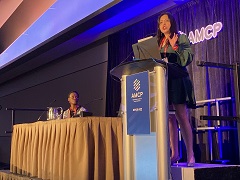
Dr. Simone Ndujiuba (left) and Dr. YuQian Liu discuss the impact of Accelerated Approval with a focus on rare disease therapies
The 2023 AMCP Annual Meeting began in earnest this morning, and the show was abuzz with attendees racing from networking breakfasts and serendipitous hallway encounters with old friends to attend the first sessions of the day.
To kick off full slate of presentations from researchers from Prime and Magellan Rx, Dr. YuQian Liu, PharmaD, Senior Director, Specialty Clinical Solutions with Magellan Rx, and Dr. Simone Ndujiuba, PharmaD, Director, Clinical Strategy and Innovation, Oncology with Magellan Rx, took the stage for an energetic conversation on Impact of Accelerated Approval: Focus on Medications for Rare Diseases, Oncology, and Alzheimer’s Disease.
They started with a set of pre-test questions and a survey for attendees to test their knowledge on FDA accelerated approval processes of medications. And though the crowd was able to recognize the topic and its impact more generally, the survey found that a majority of attendees found accelerated approval processes pose a challenge to their work, to which Dr. Liu offered her response, “Welcome to our presentation.”
The FDA instituted its Accelerated Approval Program in 1992 to allow for earlier approval for drugs that that serious conditions, like cancer or Alzheimer’s Disease. The challenge in accelerated approval is that some drugs may have an impact over time, leading to the question of when to set an endpoint for when these drugs are making an impact. As Dr. Ndujiuba explained in the case of oncology treatments, that endpoint can be indicated in a reduction of tumor size and other key markers. But this poses the question of how to set that endpoint.
Dr. Liu shared an anecdote about observing the recent birth of five Siamese kittens. Though three of the kittens were born with darker colors — and therefore might best be named, Chocolate, Coffee, or Coconut — it’s important to know that Siamese cat fur may change color some time after birth. In other words, those names may not fit the kittens’ appearance as they get older. This example highlights the challenges inherent in accelerated approvals for drugs and determining an endpoint.
And though they explained that 76% of drugs approved via an accelerated pathways received full approval, Dr. Liu and Dr. Ndujiuba emphasized that importance of taking a further look at the data.
In the same spirit of “taking a further look,” I caught up with Dr. Liu and Dr. Ndujiuba after the presentation.
Prime: What surprised you the most about this presentation to AMCP attendees?
YuQian Liu (YL) and Simone Ndujiuba (SN): We were not expecting so many attendees at an early morning session. Additionally, as we looked into the crowd, the audience engagement was amazing.
Prime: You spoke a bit about improving access to care and costs, but with treatments for these conditions being so expensive, how do we refocus to achieve these aims?
YL/SN: This is an area we think needs more collaboration between payers and the manufacturer. More discussions need to occur on how we can share the sunken cost, and perhaps value-based contracting for some of these accelerated approval products. At the end of the day, there needs to be a fine balance between access and quality of care.
Prime: What key takeaways would you like attendees, or people who can’t attend the show, to know about?
YL/SN: The number of accelerated approvals will continue to increase over the next five years. It is time to start engaging in conversations and discussions between manufacturers and payers regarding how to collaborate on data sharing, cost sharing, and ultimately, allow access to these medications that fills an unmet medical need.
AMCP Pre-Show Coverage — Behind the Presentation with Pat Gleason: Incorporating Value Framework Assessments in Coverage and Reimbursement Decisions
Updated 8:30 a.m. CT, March 22, 2023

Dr. Pat Gleason kicks off the Annual Meeting on the value framework assessments panel
It was a standing room only crowd at the Association of Managed Care Pharmacy Annual Meeting presentation on “Incorporating Value Framework Assessments in Coverage and Reimbursement Decisions.” And though it was a rainy afternoon in San Antonio, a fair amount of light was coming from the room on this complex topic.
As noted below, the mission of the event is simple, to “build the foundation to ensure patients can get the medications and treatments they need at a cost they can afford. “In a live poll of attendees in the room at the start of the talk, 62% of attendees were interested in learning more about value assessment. But what does that mean?
Value assessment is an approach of measuring value of a health care services and making care more affordable and accessible to the end user. As the speakers noted, we have constrained resources in our current health care system, and the aim of this topic is about making the most of the health care dollars spent.
I caught up with Pat Gleason, PharmD, Assistant Vice President, Prime Therapeutics to get his insights on the presentation.
Prime: What inspired this presentation?
PG: I was invited to participate in this panel presentation because Prime Therapeutics is recognized as a thought leader in medication formulary assessment. We have long standing use of analytic capabilities to use our real world integrated medical and pharmacy data to inform formulary decision making. Prime has used value assessments, including the Institute for Clinical and Economic Review (ICER) reports and AMCP dossiers in their formulary review process for years. We are proud of our commitment to comprehensive review of all research and medical literature and perform internal value assessment analytics to inform our Pharmacy and Therapeutics (P&T) review process in determining medication formulary preferred placement.
Prime: How does this presentation archive AMCP aims of improving access to care and costs?
PG: This panel discussion with leading experts in value framework medication assessment methods helps to educate others, discuss areas of uncertain and improvement, and identify value framework processes that need enhancement, including health disparities.
Prime: What key takeaways would you like attendees, or people who can’t attend the show, to know about?
PG: Medication value assessments are core and fundamental to ensuring Prime Therapeutics recommends medication coverage for the most cost effective therapies, to ensure medication affordability and access to our members.
A Q&A with Pat Gleason & David Eckwright
March 21, 2023
This week, more than 4,000 managed care professionals will converge on San Antonio, Texas for the Academy of Managed Care Pharmacy (AMCP) Annual Meeting. The mission of the event is simple, to “build the foundation to ensure patients can get the medications and treatments they need at a cost they can afford.”
Prime and Magellan Rx are proud to advance that mission, in part, by presenting seven research studies that leverage integrated medical and pharmacy claims data to evaluate real-world drug utilization and managed care pharmacy programs. Researchers from Prime and Magellan Rx also will present education sessions on a range of research topics, including drug trends and managed care strategies, approval for medications that treat rare diseases and more.
We caught up with Pat Gleason, PharmD, Assistant Vice President for Health Outcomes at Prime, and David Eckwright, Senior Director of Specialty Analytics and Informatics at Magellan Rx, to learn more about the AMCP Annual Meeting and how Prime + Magellan Rx will be involved in this years’ event.
Pat and David, thank you for your time. Both Prime and Magellan Rx have been present at prior AMCP Annual Meetings, but this year will be the first time since Prime acquired Magellan Rx late last year. What does it mean to you to present research to the industry as a new organization?
Pat Gleason (PG): The Prime and Magellan Rx research presentations complement each other. Prime’s presentations focus on integrating real world medical and pharmacy data to explain the value of our products and programs. Three key examples come to mind:
- the medical savings associated with improving medication adherence, which quantifies the potential financial impact of GuidedHealth;
- the value of medication dispensing through IntegratedRx, which can reduce medication waste when compared to specialty pharmacy dispensing;
- and the savings from reducing cystic fibrosis drug therapy oversupply through Prime’s HighTouchRx
Magellan Rx presentations highlight medical drug management and forecasting capabilities with presentations evaluating biosimilar products uptake, the use of GLP-1a drugs in weight loss trends, and modeling costs of ophthalmic vascular endothelial growth factor inhibitors . It’s great to see how our combined research is addressing key trends in the marketplace and our shared focus on improving health outcomes.
David Eckwright (DE): I agree – it’s exciting to see our combined knowledge, skills, and innovative spirit come together through our new, combined organization. The research being presented at AMCP this year reflects these attributes and demonstrates our shared expertise in using real-world data to uncover innovative, drug-focused strategies to lower health care costs.
As noted before, the objective of the Annual Meeting is to “build the foundation to ensure patients can get the medications and treatments they need at a cost they can afford.” As you look at the research your teams will be presenting, how are Prime and Magellan Rx supporting this objective?
PG: It’s quite simple because Prime and Magellan’s research topics have a similar objective as the AMCP Annual Meeting. Identifying and quantifying the value managed care pharmacy programs bring, and finding drug therapy optimization opportunities, helps to ensure that affordable health care is delivered to our members.
DE: I’ll add that the research presentations provide crucial insights on a variety of important industry topics, such as on/off-label use, competitive categories, adherence, stockpiling and waste. These findings also reflect the value managed care programs have in optimizing therapy and avoiding unnecessary costs.
Pat, you have been involved in AMCP for quite some time – how has the organization evolved to get where it is today?
PG: AMCP has evolved to be the premier source for managed care pharmacy practice information and education. In their evolution, AMCP updated their mission statement: “To improve patient health by ensuring access to high-quality, cost-effective medications and other therapies. AMCP is the professional association leading the way to help patients get the medications they need at a cost they can afford.” AMCP is works to ensure patient access to medication and maintain medication affordability.
David, you once were a retail pharmacist prior to joining Prime + Magellan Rx. For pharmacists who may not attend the AMCP Annual Meeting, what might surprise them if they did?
DE: I would imagine that they would be surprised to see the scope of therapies and care settings involved in managed care pharmacy. These include digital therapeutics delivered via phone apps, drugs picked up at the pharmacy, infused therapies administered in the clinic, outpatient or inpatient hospital settings which include cell and gene therapies, and more. This evolving therapy landscape makes attending AMCP so important as it helps managed care professionals stay informed of therapy innovations and the regulatory and management considerations surrounding them.
Before we move on, I’d like to ask you a lighter question. A lot of work takes place at these events – and this years’ AMCP is no exception – but what was one of the more fun or surprising things you experienced at a prior AMCP Annual Meeting?
PG: As pharmacy practice and managed care continue to intersect and evolve, every AMCP brings the most up-to-date policy learnings, drug information pipeline information, recent new drug utilization and spend trends, managed care pharmacy program insights, and drug predictive/forecasting insights. I enjoy attending and learn from each AMCP meeting, but what surprises me the most is how each meeting I attend consistently provides me with important nuggets I can take back and directly apply to my daily work.
DE: ACMP provides a great opportunity for meeting and reconnecting with colleagues in-person, which is something I have grown to appreciate even more in our work from home world. The shared, in-person experience at AMCP has helped forge stronger relationships and foster openness and collaboration with people from across our industry.
Thank you, Pat and David.
We look forward to seeing all the presentations and surprises in store at this years’ AMCP Annual Meeting, and if you can’t be in San Antonio, keep an eye on the Perspectives Blog or follow us on Twitter at @Prime_PBM and @Magellan_Rx for real-time updates.
And rest assured, we will confirm if there’s a basement in the Alamo…
Related news
Perspectives
July 25, 2024
Quarterly Drug Pipeline: July 2024
Clinical insights and competitive intelligence on anticipated drugs in development
Perspectives
July 22, 2024
Oncology Insights: 2024 ASCO Annual Meeting key findings
Findings from this year’s American Society of Clinical Oncology (ASCO) Annual Meeting will likely lead to clinical practice changes and U.S. Food and Drug Administration (FDA) drug approvals or expansions
Perspectives
July 16, 2024
LISTEN NOW: Beyond the business – Stories of corporate kindness | Pharmacy Friends Podcast
In this episode, we talk about how our employees' help goes beyond our work in health care, aiding in philanthropic efforts